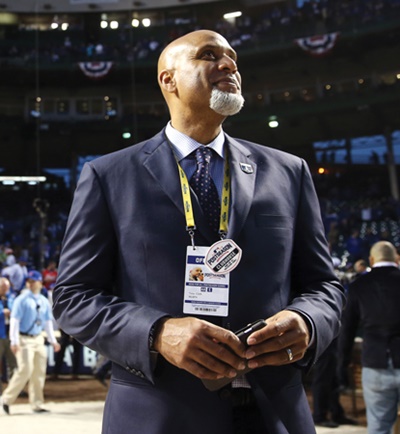The MLB Players Association insists its membership will be able to participate fully in the accelerating economic growth predicted for Major League Baseball, despite new restrictions on player spending in the sport’s new five-year labor deal.
The collective-bargaining agreement, struck just hours before the old deal expired at midnight Dec. 1, contains new restrictions on international amateur signings; heightened tax rates on teams exceeding the sport’s competitive balance tax, commonly known as the luxury tax; and modest annual increases to the sport’s minimum salary (see box).
 |
The MLBPA’s Tony Clark: Revenue split will stay near 50-50 in the new CBA.
Photo by: GETTY IMAGES
|
The measures, on the surface, would seem to stand in contrast to league projections that annual industry revenue will grow sharply, from about $10 billion to more than $15 billion over the next several years. And the new deal terms prompted prominent agent Scott Boras, at the sport’s annual winter meetings last week, to liken the CBA to a “Berlin Wall” that would cut MLB off from accessing many top Latin athletes.
But MLBPA Executive Director Tony Clark said the new deal does not contemplate a significant redistribution of baseball industry revenue, and projected that players would continue to share in the sport’s fiscal growth.
“We wouldn’t have agreed to the deal otherwise,” said Clark in an interview at the union’s New York headquarters. “The agreement is becoming more complex, as the industry itself grows and becomes more complex. … But we believe this agreement will allow both sides to benefit once all the dust settles. Everything in here is designed to continue the trends we’re seeing around growth that’s occurring.”
Clark last year said the players’ overall industry revenue percentage split with the owners “is as close to 50-50 as it’s been in a long time.” With the new deal, Clark said he doesn’t anticipate a significant change.
“There are going to be ebbs and flows to the percentage, but the expectation is that we stay right in that general area,” he said.
MLB agreed with the union’s assessment.
“We don’t believe the agreement will radically change the economics of the game,” said Dan Halem, MLB chief legal officer, and a key architect of the deal for management.
Among the more specifically player-friendly economic measures in the new deal are changes to free agency rules that starting next offseason will no longer require a signing team to surrender a first-round draft pick as compensation to a player’s former club. Starting after the 2017 season, the compensation to former teams will instead involve lower-round picks and international signing bonus pool money, changes that should ease the drags some players have found on the free agency market. The qualifying offer system that serves as a prerequisite for that compensation remains, but players now receive a qualifying offer once, providing more market freedom for veteran players.
Already, last week’s winter meetings featured several prominent free agent signings that continued to show growth in player compensation. The San Francisco Giants signed Mark Melancon to a four-year, $62 million deal that was the largest ever for a closer. That record lasted all of two days, until the New York Yankees signed Aroldis Chapman to a five-year, $86 million contract.
The labor deal arguably had an even bigger effect on the non-economic front, where the players sought and received improvements to their general working conditions, including more off days in the schedule, a requirement for each team to hire a full-time chef, access to sports psychologists, and the development of best practices and standards for clubhouse amenities. The new deal also creates anti-bullying and anti-hazing rules, allows for the voluntary use of wearable technology, and implements sharp increases in the number of blood and urine tests for drugs.
“We covered a lot of ground and hit a lot of areas I think will serve to improve the sport over the course of the deal,” Halem said.
Despite striking the new deal with just hours to spare, there never was any discussion between the league and union about extending the deadline. Months of on-and-off negotiations led to an all-night bargaining session near Dallas on Nov. 29. After sleeping, in some cases as little as an hour the morning of Nov. 30, the negotiators reconvened later that day and reached a verbal agreement about 8 p.m. Central time. A memorandum of understanding was quickly drafted, relying in part on lawyers stationed back in New York, and was signed just minutes before midnight. Formal ratification by both sides is now expected over the next two weeks.
“As I’ve said many times, labor peace isn’t ever the goal. A fair and equitable deal is, and we think we have one,” Clark said.




